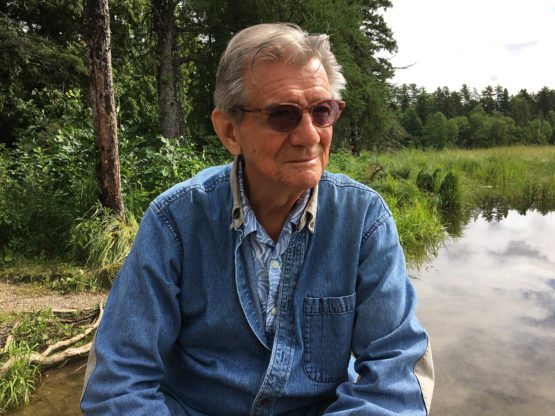Author and Native American advocate Gerald Vizenor named Stanford Haas Center’s 2020 Distinguished Visitor
Gerald Vizenor, an award-winning author and citizen of the White Earth Nation, will be in residence at Stanford during winter quarter as the Mimi and Peter E. Haas Distinguished Visitor.
Gerald Vizenor – author of more than 30 books, novels and poetry collections, and recipient of the Western Literature Association’s Distinguished Achievement Award – will be in residence at Stanford during winter quarter as the Mimi and Peter E. Haas Distinguished Visitor.

Gerald Vizenor will be in residence at Stanford during winter quarter as the Mimi and Peter E. Haas Distinguished Visitor. (Image credit: Courtesy of Gerald Vizenor)
On Jan. 15, Vizenor, professor emeritus of American Studies at the University of California, Berkeley, will present the Haas Distinguished Visitor Lecture on Public Service and the University on “Native Survivance and the Literature of Engagement.”
“Through his scholarship, Gerald Vizenor has elevated the voices and illuminated the experiences of Native Americans,” said Harry Elam Jr., senior vice provost for education and vice provost for the arts. “He brings unique experience spanning pathways of public service – as a veteran, community advocate, journalist and faculty member. We are delighted to welcome him to Stanford.”
Distinguished Visitor Program
The Mimi and Peter E. Haas Distinguished Visitor Program is a 10-week residency that brings to Stanford prominent individuals whose lives have had a significant impact nationally and globally through public service. Vizenor’s visit this year is co-sponsored by the Native American Cultural Center.
Previous Distinguished Visitors have included On Being podcast host Krista Tippett; journalist Ted Koppel, MA ’62; Spelman College President Emeritus Beverly Daniel Tatum; and artist Rick Lowe, among others.
Vizenor’s work as a scholar, author and community advocate draws on his life experiences, including his roots as a member of the White Earth Nation in Minnesota and his military service with the U.S. Army in Japan in the aftermath of the Korean War. He was a delegate to the Constitutional Conventions and principal writer of the Constitution of the White Earth Nation.
He has written historical fiction, poetry, critical theory, science fiction and an autobiography. His kabuki novel, Hiroshima Bugi: Atomu 57, was inspired by his experiences in post-atomic Japan titled. Two of his novels – Griever: An American Monkey King in China and Shrouds of White Earth – have earned American Book Awards.
A descendant of Augustus Hudon Beaulieu, publisher of The Progress, the first independent newspaper on the White Earth Reservation, Vizenor carries forward The Progress’s founding mission to “advocate constantly and without reserve” for the interest of Native communities.
Timely visit
“The timeliness of Vizenor’s visit is significant, as 2020 marks the 50th anniversaries of both the Stanford American Indian Organization and the Stanford Powwow, which, in the spirit of Vizenor’s teachings, are testament to indigenous survivance and excellence,” said Karen Biestman, associate dean and director of the Native American Cultural Center.
“Stanford’s recent renaming of three campus landmarks bearing the Serra name aligns with the scholarly, community-centered pathway to institutional change that Vizenor’s work and life so richly illuminate,” she added.
Vizenor has taught at a number of universities about Native American literature, history, philosophy and art, in addition to considering theories of racial and cultural representations, human rights and comparative critical studies of literary art.
He explains the subject matter of his Haas Lecture this way: “Native American survivance is an active sense of historical presence, a renunciation of political dominance, themes of tragedy and cultural victimry. Native survivance is literature of engagement.”
Describing the connection between his work and public service, Vizenor writes, “My sense of public service is a common ambition to create a communal narrative that celebrates chance over fate and denies the separatism of dominant political authority.”
During his Stanford residency, he will engage with students, faculty and staff in discussions and workshops and attend events hosted by community organizations. More information about Vizenor’s visit is on the Haas Center website. Faculty, departments and community organizations interested in hosting a workshop or other event with him should complete this form.
